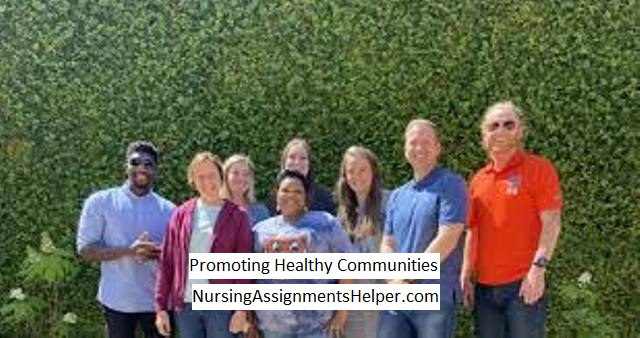302HSC Promoting Healthy Communities
Introduction : A community-led approach to health improvement is now a major feature of health improvement policy and practice, both in the UK & internationally. The approach is concerned with supporting communities experiencing disadvantage and poor health outcomes to identify and define what is important to them about their health and wellbeing, the factors that impact on their wellbeing and take the lead in identifying and implementing solutions (Daly and Barr 2008). Community centred approaches are not just community-based, they are about mobilising assets within communities, promoting equity and increasing people’s control over their health and lives (PHE 2015). Community assets, such as the skills and knowledge, social networks and community organisations, are useful building blocks for good health (PHE 2015).
With more people than ever before expected to live into their 60s and beyond, a growing number of communities around the world optimize environments and introduce age-friendly initiatives in response to demographic changes in order to meet local needs and improve quality of life for individuals as they age. These local actions go beyond the health sector and take into account “aspects of the natural and built environment, social services and programmes, cultural attitudes, social capital, equity and inclusion”, since they “all influence the degree to which older people can function and participate in society” (WHO 2015: 3)
302HSC Promoting Healthy Communities
302HSC Promoting Healthy Communities Assignment

Completion of this assignment will address the following learning outcomes:
* Justify the potential and describe the process of systematically working with
communities to develop community participation and health empowerment
* Critically analyse the role of the worker in relation to developing inclusive, cohesive
community initiatives
* Critically analyse inter-professional/ multi agency working practices in health
promotion and explain why intersectoral collaboration can be difficult to achieve
Task :
You are required to create an A3 academic poster (digital) and present the poster (presentation will last 10 minutes) to your peers/tutors. Your poster should focus on:
“Why is X city a good place to live in or move to after retirement?”
Guidance notes and considerations
This is an individual task that should reflect the learning outcomes of the module and focus on any city in a geographical area of your choice.
You will need to provide an assessment of your chosen community, especially in relation to justifying it as an age-friendly setting that encourages inclusion, cohesion, intersectoral collaboration, health promotion, community participation, and empowerment.
Additionally, you will need to conduct a community asset mapping exercise to provide an overview and insight into the associations, organisations and the individual characteristics within your community.
You will also need to demonstrate critical analysis against the role of the worker and the importance of intersectoral, inter-professional approaches
Please make sure your work is well supported by relevant academic sources and submitted in PDF format. Your academic poster could be in the range of 250-750 words. Additional support on use of suitable software for poster development will be provided during taught sessions.
302HSC Promoting Healthy Communities
Feel free to be as creative as you wish in your presentation and make sure it is interesting, informative and engaging. You will have the option to:
•Present your poster via Big Blue Button, Microsoft Teams or Zoom during a scheduled one-to-one session with the tutor on Friday 22nd May 2020; OR
• Pre-record your presentation using Screencast-o-Matic or an alternative software, upload this to OneDrive, and include the link to this recording on the academic poster you submit to Turnitin on Moodle. Please note: You must include the link to recording before you submit the poster. Guides on how to use Screencast-o-Matic to record your presentation and share it using OneDrive are available on Moodle. Additional in-session support will be provided.
Your individual preference for the presentation, as above, will need to be communicated to your 0tutor, Luda Ruddock ([email protected]) before 18th May 2020
Late Submission :
If you are not able to complete your coursework on time due to extenuating circumstances, the ONLY way to receive an extension (up to 5 working days) or a deferral (anything longer than 5 working days) is to contact a Registry team member located at your specific CU site.
- Extenuating circumstances are defined by CU as ‘genuine circumstances beyond your control or ability to foresee, and which seriously impair your assessed work’.
- Please note that you will need to provide third party evidence to support your reasoning for requiring an extension or deferral.
- Your course tutor is NOT able to approve an extension or a deferral, if you have not completed the official forms and had your request approved your work will count as not submitted and receive a zero mark
302HSC Promoting Healthy Communities

Plagiarism and Malpractice
- You are encouraged to check the originality of your work by using the draft Turnitin links on your Moodle Web.
- Collusion between students (where sections of your work are similar to the work submitted by other students in this or previous module cohorts) is taken extremely seriously and will be reported to the academic conduct panel. This applies to all coursework and exam answers.
- A marked difference between your writing style, knowledge and skill level demonstrated in class discussion, any test conditions and that demonstrated in a coursework assignment may result in you having to undertake a Viva Voce in order to prove the coursework assignment is entirely your own work.
- If you make use of the services of a proof reader in your work you must keep your original version and make it available as a demonstration of your written efforts.
- You must not submit work for assessment that you have already submitted (partially or in full), either for your current course or for another qualification of this university, unless this is specifically provided for in your assignment brief or specific course or module information. Where earlier work by you is citable, i.e., it has already been published/submitted, you must reference it clearly. Identical pieces of work submitted concurrently will also be considered to be self-plagiarism.
Submission Guidelines
There should be a title page which clearly identifies the following
- Name of the module * Title of the Assessment
- Assessment number * Word count
The word count identified includes quotations, but excludes the bibliography and unless specifically stated, encompasses a discrepancy of + or – 10%.